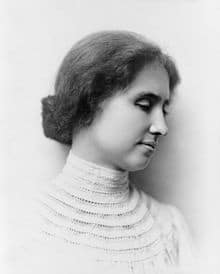Helen Keller Died 43 Years Ago Today at Age 87
June 1, 2011
 Helen Adams Keller (June 27, 1880 – June 1, 1968) was an American author, political activist, and lecturer. She was the first deafblind person to earn a Bachelor of Arts degree.[1][2] The story of how Keller’s teacher, Anne Sullivan, broke through the isolation imposed by a near complete lack of language, allowing the girl to blossom as she learned to communicate, has become widely known through the dramatic depictions of the play and film The Miracle Worker.
Helen Adams Keller (June 27, 1880 – June 1, 1968) was an American author, political activist, and lecturer. She was the first deafblind person to earn a Bachelor of Arts degree.[1][2] The story of how Keller’s teacher, Anne Sullivan, broke through the isolation imposed by a near complete lack of language, allowing the girl to blossom as she learned to communicate, has become widely known through the dramatic depictions of the play and film The Miracle Worker.
A prolific author, Keller was well-traveled, and was outspoken in her opposition to war. A member of the Socialist Party of America and the Wobblies, she campaigned for women’s suffrage, workers’ rights, and socialism, as well as many other leftist causes.
Keller went on to become a world-famous speaker and author. She is remembered as an advocate for people with disabilities, amid numerous other causes. She was a suffragist, a pacifist, an opponent of Woodrow Wilson, a radical socialist and a birth control supporter. In 1915 she and George Kessler founded the Helen Keller International (HKI) organization. This organization is devoted to research in vision, health and nutrition. In 1920 she helped to found the American Civil Liberties Union (ACLU). Keller and Sullivan traveled to over 39 countries, making several trips to Japan and becoming a favorite of the Japanese people. Keller met every U.S. President from Grover Cleveland to Lyndon B. Johnson and was friends with many famous figures, including Alexander Graham Bell, Charlie Chaplin and Mark Twain.
Keller was a member of the Socialist Party and actively campaigned and wrote in support of the working class from 1909 to 1921. She supported Socialist Party candidate Eugene V. Debs in each of his campaigns for the presidency.
Keller and her friend Mark Twain were both considered radicals at the beginning of the 20th century, and as a consequence, their political views have been forgotten or glossed over in popular perception.[18] Newspaper columnists who had praised her courage and intelligence before she expressed her socialist views now called attention to her disabilities. The editor of the Brooklyn Eagle wrote that her “mistakes sprung out of the manifest limitations of her development.” Keller responded to that editor, referring to having met him before he knew of her political views:
“ At that time the compliments he paid me were so generous that I blush to remember them. But now that I have come out for socialism he reminds me and the public that I am blind and deaf and especially liable to error. I must have shrunk in intelligence during the years since I met him…Oh, ridiculous Brooklyn Eagle! Socially blind and deaf, it defends an intolerable system, a system that is the cause of much of the physical blindness and deafness which we are trying to prevent.” Helen Keller
